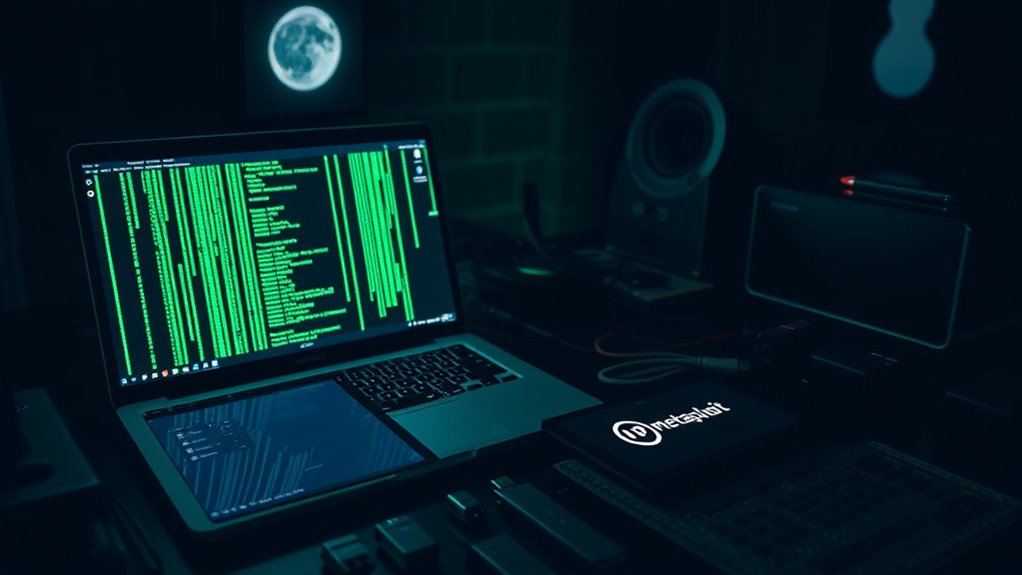Essential tools for ethical hackers, like Kali Linux and Metasploit, let you efficiently identify and fix vulnerabilities in systems. Kali Linux provides a user-friendly environment packed with security tools for testing, while Metasploit helps automate and customize attacks to uncover weaknesses. Using these tools enhances your ability to strengthen defenses and stay ahead of threats. If you’re curious about more tools and their benefits, there’s plenty more to explore on this topic.
Key Takeaways
- Kali Linux provides a comprehensive platform for ethical hacking, housing numerous tools for penetration testing and vulnerability assessment.
- Metasploit is a powerful framework that allows ethical hackers to develop and execute exploit code for testing system vulnerabilities.
- Vulnerability scanning tools like Nessus and OpenVAS help identify potential security flaws before they can be exploited by malicious actors.
- Using these tools enables ethical hackers to simulate real-world attacks, improving understanding of vulnerabilities and strengthening defenses.
- Combining multiple security tools enhances protection by addressing weaknesses from various angles and facilitating continuous improvement in security practices.

As technology evolves, so do the tools that ethical hackers rely on to protect systems and data. If you’re stepping into the world of ethical hacking, understanding the essential tools at your disposal is vital. Among the most important are penetration testing and vulnerability scanning tools, which help you identify weaknesses in systems and applications before malicious hackers can exploit them.
Penetration testing tools simulate real-world attacks on networks and systems to uncover vulnerabilities. Tools like Metasploit are invaluable for this purpose. With Metasploit, you can develop and execute exploit code against a remote target. It’s a versatile framework that helps you automate attacks, making it easier to test systems effectively. You can also customize your tests with various payloads, allowing you to adapt to different scenarios. By using Metasploit, you can gain insights into how hackers operate, enabling you to strengthen defenses accordingly.
Penetration testing tools like Metasploit empower ethical hackers to simulate attacks, uncover vulnerabilities, and strengthen system defenses effectively.
Vulnerability scanning tools, on the other hand, focus on identifying potential entry points before they can be exploited. Tools like Nessus and OpenVAS can scan systems for known vulnerabilities, providing detailed reports on what needs to be fixed. These tools save you time and effort by automating the scanning process, allowing you to focus on remediation rather than manual checks. Regularly conducting vulnerability scans helps guarantee that your systems remain secure, especially as new threats emerge.
Another essential tool in your arsenal is Kali Linux. This operating system is tailored for penetration testing and comes equipped with a wide array of tools designed for ethical hackers. From network analysis to web application testing, Kali Linux streamlines your workflow and provides a thorough environment for your security assessments. Its user-friendly interface and extensive documentation make it accessible, whether you’re just starting or are a seasoned professional.
Incorporating these essential tools into your ethical hacking toolkit will markedly enhance your ability to protect systems and data. The combination of penetration testing and vulnerability scanning allows you to approach security from different angles, guaranteeing a robust defense against potential threats. As you continue to hone your skills and knowledge, utilizing these tools will empower you to make informed decisions about security measures and practices. Embrace the technology available, and you’ll be well on your way to becoming a proficient ethical hacker committed to safeguarding digital environments.
Frequently Asked Questions
What Certifications Should I Pursue as an Ethical Hacker?
You should pursue certifications like Certified Ethical Hacker (CEH) and Offensive Security Certified Professional (OSCP). These will enhance your skills in penetration testing and vulnerability assessment. Additionally, consider CompTIA Security+ for foundational knowledge and Certified Information Systems Security Professional (CISSP) for advanced expertise. Each certification strengthens your credibility and prepares you for real-world challenges, helping you stand out in the ethical hacking field. Start your journey today!
How Can I Legally Practice Ethical Hacking Skills?
To legally practice your ethical hacking skills, always verify you’ve got permission from the network owner. Familiarize yourself with network legalities and establish clear permission protocols before testing systems. You can join bug bounty programs, where companies invite hackers to find vulnerabilities in exchange for rewards. Additionally, set up your own lab environment to experiment safely without impacting real networks. Remember, ethical hacking requires responsible practices and respect for privacy.
What Are the Best Online Resources for Learning Ethical Hacking?
To learn ethical hacking effectively, think of it like mastering a language; you need practice and the right resources. Websites like Cybrary and Udemy offer courses on network scanning and intrusion detection, making concepts tangible. YouTube channels also provide practical demonstrations that can help solidify your understanding. Engaging in online forums and communities can further enhance your skills, allowing you to ask questions and share insights with fellow learners.
How Frequently Should I Update My Hacking Tools?
You should update your hacking tools regularly, ideally every few weeks or whenever a significant security update is released. Tool update frequency is vital for maintaining effectiveness and security. Regularly checking for updates ensures you’re using the latest features and fixes, which enhances your overall hacking tool maintenance. Staying current not only improves your skills but also helps you adapt to evolving cybersecurity threats effectively. Don’t let outdated tools hold you back!
Can Ethical Hackers Work Remotely or Freelance?
Absolutely, you can work remotely or freelance as an ethical hacker. Imagine the thrill of solving cybersecurity puzzles from the comfort of your home. With the rise of remote work, companies are increasingly seeking skilled professionals like you to protect their systems. Freelance opportunities abound, allowing you to choose projects that excite you. Whether it’s a short-term gig or a long-term contract, the possibilities are endless in this dynamic field.
Conclusion
In the ever-evolving world of cybersecurity, having the right tools at your disposal is essential for ethical hackers. Did you know that 95% of cybersecurity breaches are due to human error? By mastering tools like Kali Linux and Metasploit, you can help organizations identify vulnerabilities and prevent these costly mistakes. With the right skills and tools, you’re not just a hacker; you’re a critical protector in today’s digital landscape. Stay sharp and keep learning!









